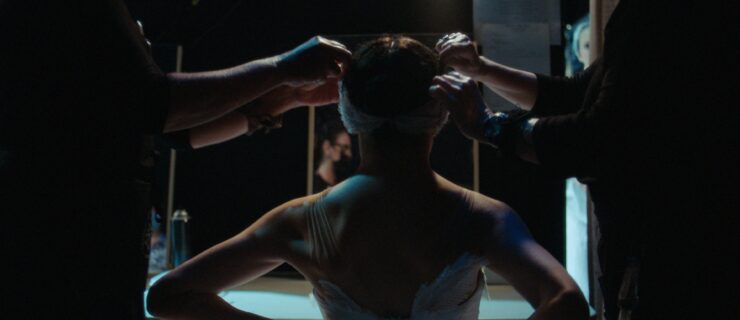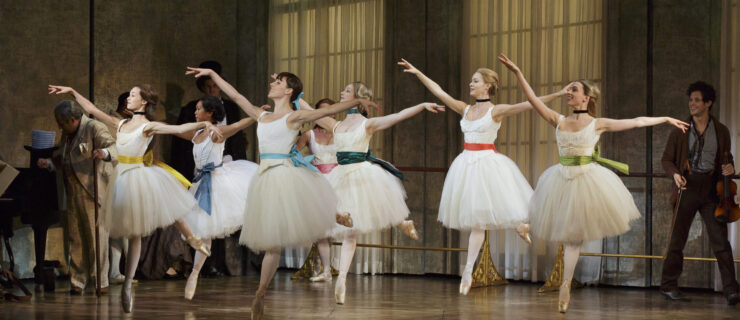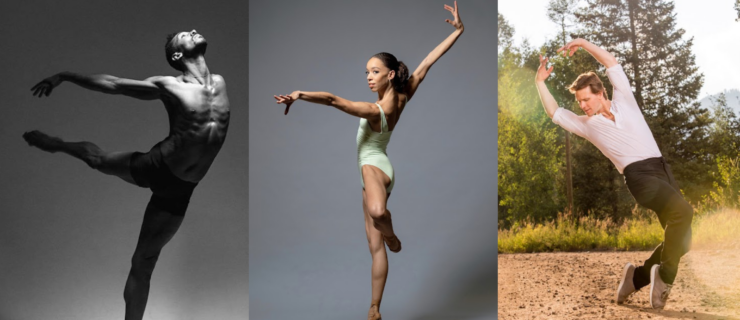Former “Baby Ballerina” Jessica Flynn on Her YA Novel and the Secrets to Surviving in Ballet
Most young dancers dream about how Jessica Flynn’s ballet career began. After performing several lead roles at School of American Ballet’s Workshop and winning the prestigious Mae L. Wien Award in 2002, she got an apprenticeship with New York City Ballet at age 16 and her corps contract less than a year later. Some soloist roles followed, and she appeared to have a bright future at the company. But just before her three-year mark, she left NYCB and never performed professionally again.
Flynn is now a ballet teacher, a holistic health coach for performing artists, a candidate for a master’s in social work, a wife and a new mom. She’s also an author. In 2016, she published Dancing in Time, the fictional tale of Charlie, a 37-year-old marketing executive who can’t shake the failure of her ballet career. She wakes up one morning in her 17-year-old body, and has the chance to redo her career with the benefit of hindsight. The book deals with themes of extreme competition, body image and weight, disempowering relationships, and how all of these factors can suck the joy out of dancing—yet it’s surprisingly humorous and entertaining.
Flynn is rereleasing Dancing in Time now, with revisions inspired by her education in cognitive behavioral therapy and the momentum of the moment for changing ballet’s culture.
We caught up with Flynn to learn more about her story and why she hopes young dancers will read the book and internalize its message.
Your ballet career started off on a fast track, then ended abruptly. What was behind your decision to leave NYCB?
Dance is about joy, and I had lost the joy in the company. Toward the end of my time there, I performed in the corps of Balanchine’s Square Dance, and I really danced my heart out. The love for dance came back in full force and I thought in that moment that I’d stay with NYCB after all. When I came off the stage a member of the artistic staff was in the wings and gestured for me to come talk to them. I thought they might have noticed my performance, but instead they looked me dead in the eye and said only “Your ribbons are filthy.”
When I think of that final joyous performance, it was just about this person crushing it. That’s when I knew I couldn’t do it anymore. I didn’t have the tools or support to stand firm in what I felt, and I allowed them to steal all that joy from me.
Peter [Martins, NYCB’s former ballet master in chief] used to say to me “No word is good word.” But I needed more feedback about how it’s going, telling me what to improve, nurturing me as a dancer and not just a worker. The culture of ‘Deal with it on your own’ didn’t work for me. I don’t blame anybody, but I would have done better in a culture with more empathy and support.
While conditions could have been different, I discovered the realities of professional ballet were not right for me. I loved to dance and perform, but the daily details of the craft, worrying about my weight every day, wasn’t sustainable for me. It’s why I don’t harbor resentment. My transition would have been more graceful, but it would have happened regardless.
What inspired you to write
Dancing in Time?
I started the book nine years after I left the company. Writing it was cathartic. I also had been teaching ballet for some years and realized I had gained important perspective and wanted to find a way to share it with young dancers.
I was on vacation with a friend in Mexico swimming in the ocean and it just hit me that I could write a novel about this. I came out of the water and announced that I was going to write a book, and I did!

The cover for Jessica Flynn’s YA novel, Dancing in Time
Courtesy Jessica Flynn
What was it like writing the book, your first major writing project?
I had done so much self-work since leaving the company, my perspective really changed. I had this fantasy: What if I could go back and dance with what I know and feel now, with all these tools and empowerment? I would feel grateful and joyful every day, and wouldn’t let a bad breakup or a bad weight talk derail me. To write passages where Charlie is back in that world but with more confidence and perspective, feeling the love of dance in the moment and understanding all the challenges for what they are, and not making life or death out of everything, was freeing.
But I had to apply all the lessons I was writing about to the writing process: to be kind with myself, knowing it didn’t have to be perfect this time or ever, and not compare myself to other writers.
It was awesome how the characters emerged; they all really wrote themselves. Most were not based on anyone specific. I grew to care about them and inhabit their world. By the time I got to the end, the dramatic final sequence just wrote itself. It was amazing, like some kind of force possessed me, which is how I used to feel when I was dancing.
I also had a great advisor, Christian De Matteo at the LEAP Program. I couldn’t have done it without him.
How much of the book is based on your own experience?
Well, obviously I never traveled back in time! But there are parallels. I struggled with my weight. I was told I “looked like a totally different person than when I got into the company,” and I was 7 pounds heavier. I was ashamed to be seen in class after that, and it was a constant feeling of being judged. And similar to Charlie, I went on a strict diet, although I never did a juice cleanse for a full month, but some people did do that. The breakup Charlie goes through with a company member was also something I experienced—processing it in a way that broke my self-confidence.
You wrote this book with young dancers in mind. What do you hope they will take away from it?
I want to help dancers avoid what happened to me, or the patterns of thinking that derailed me. I’m doing that in my teaching at Downtown Dance Factory, and health coaching dancers one-on-one through Better with Jess.
I had a lot of self-defeating thoughts and I didn’t have the confidence or self-efficacy to navigate my way through those questions. There’s evidence that cognitive behavioral therapy can make a big difference in how we react to and think about what happens to us. It’s made a big difference for me. I want to give dancers more power over their experience so they can enjoy dancing, whether it’s for a career or not.




